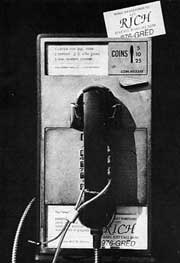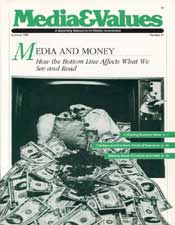The Culture of Capitalism
|
This article originally appeared in Issue# 47
|
The late mythologist and philosopher Joseph Campbell once noted that in medieval times the approach to a city was dominated by the spires of its cathedral and castle. Nowadays, the soaring towers of commerce are the first things to strike the eye.
People build their lives around these towers. Communities take shape. Work skills are learned, social relationships are formed and personal aspirations are molded. A dense matrix of values grows up around and intertwines with these modern temples.
Perhaps their predominance explains why the business of business has become such a cultural preoccupation. In recent years, a dozen new business programs have burst forth on commercial television, public television and cable. Americans who once found their leaders in Congress, the entertainment world or sports, now idolize business leaders like Lee Iacocca, Steven Jobs, H. Ross Perot, Carl Icahn, and, until their fall from grace, Ivan Boesky and Mike Milken.
If American business has become a preeminent force shaping our culture and its values, what example has it set? What attitudes and behavior have its leaders endorsed and fostered?
When The New York Times took the pulse of corporate leadership--before the 1987 stock market crash--it found that "America's chief executives have become reluctant, even scared, to stick with a money-losing project or a marginal business, no matter how strongly they believe in it. They eschew loyalty to workers, products, corporate structure, businesses, factories, communities, even the nation. All such allegiances are viewed as expendable. With survival at stake, only market leadership, strong profits and a high stock price can be allowed to matter."
There are no two-legged villains in this "get-while-the-getting is good" atmosphere. Only victims. I've never met a CEO who didn't feel he was in a trap not of his own making.
Their trap is the ethic of materialistic hedonism that the free enterprise system, as Daniel Bell has said, "uses to subvert the very values that sustain it." If American business insists upon defining itself solely in terms of its market share, profitability and stock price -- if its short-term material goals are allowed to prevail over all else -- then business tends to subvert certain moral-cultural values that undergird the entire system. Such values are social conscience, commitment to one's community, loyalty to one's company...in short, a sense of the commonweal. From the decline of public morality and personal values to the culture of narcissism to young people's inability to read and write, each of a hundred social ills originates with this trickle-down value system and its bottom line mentality.
This ethic breeds an atmosphere where leadership everywhere--business, Congress, government agencies, legislatures -- refuses through greed  or myopia or weakness -- to make provisions for the future. And in this kind of climate, with this kind of short-sighted leadership, we have been raising generations of children to believe that there is nothing between winning and losing. The notion that life has anything to do with succeeding at the level of doing one's best, or that some of life's richest rewards are not monetary, is lost to our kids in this short-term, bottom-line climate.
or myopia or weakness -- to make provisions for the future. And in this kind of climate, with this kind of short-sighted leadership, we have been raising generations of children to believe that there is nothing between winning and losing. The notion that life has anything to do with succeeding at the level of doing one's best, or that some of life's richest rewards are not monetary, is lost to our kids in this short-term, bottom-line climate.
America has become a game show. Winning is all that matters. Cash prizes. Get-rich-quick. We are the captives of a culture that celebrates instant gratification and individual success no matter the larger costs. George Will, in his book, Statecraft as Soulcraft, argues that the country's future is imperiled unless our leaders can cultivate in citizens a deeper commitment to the commonweal. Instead of heeding that admonition, we are turning the commonweal into the Commonwheel of Fortune.
In playing the Commonwheel of Fortune, what matters most are the numbers: Who can amass the highest sum, who can become Number One? The culture of business seems to revolve around a series of numerical scales: the Nielsen ratings, the Dow-Jones index, opinion polls and cost-benefit analyses.
America has become a game show.
Winning is all that matters. Cash prizes. Get rich quick.
We are turning the commonweal into the Commonwheel of Fortune.
As we rely throughout the culture on this imperium of numbers, we too easily forget that no numerical scale can truly represent the values that are most important: The spirit that makes a worker want to give his or her best. The persistence that helps a less-endowed competitior prevail. The altruism that yearns to be used. The artistic impulse that creates a film or novel or TV show that becomes a cherished cultural symbol.
The task of creating the culture that honors these things instead of the bottom line is not a problem to be left up to someone else. This is a climate we are seeking to change--and each of us, in our own circles of influence, can help alter the thousands of thermostats that control our national climate.
We are talking here about a long-term commitment to changing our culture and values -- a moral reconstruction project working in tandem with economic goals. For starters, we can begin to rehabilitate the prestige of public service -- in government, in nonprofit groups, in the professions.
We can work to harness the natural idealism of young people, encouraging them to see life in the long term and explore alternatives.
We can begin to talk more about the ethical standards of business and learn how to nurture a more enlightened spirit of enterprise.
I have built my career by tapping into that mysterious substratum of the public psyche that lies just below consciousness. And despite what many interpret as overt signs that Americans are not ready to rally behind a more compassionate, morally thoughtful leadership, I believe the rest of this decade and the next will show otherwise. I truly believe the American people are ready to move beyond the myth of the bottom line – if they have some able leadership to show them the way.



